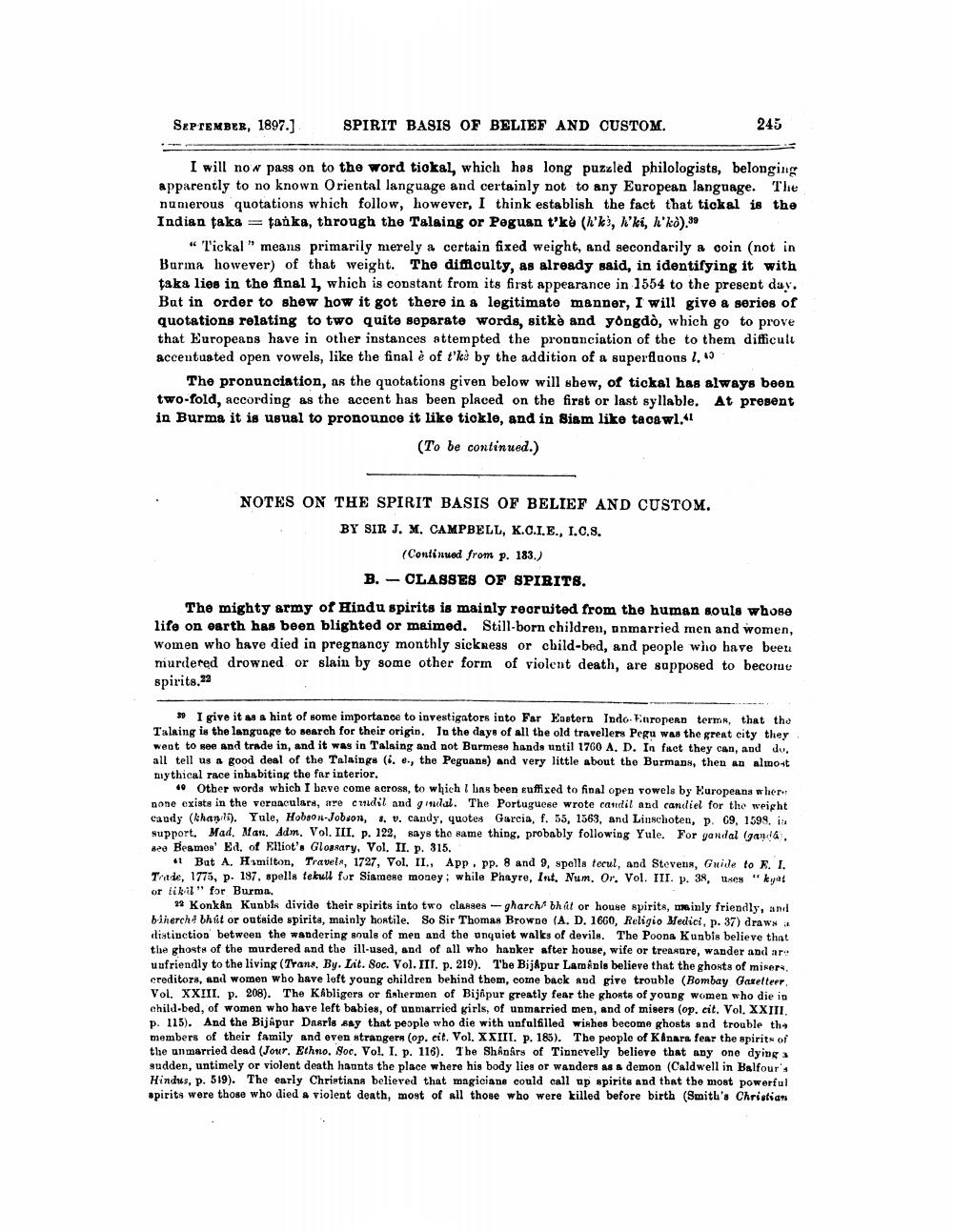________________
SPIRIT BASIS OF BELIEF AND CUSTOM.
SEPTEMBER, 1897.]
I will now pass on to the word tiokal, which has long puzzled philologists, belonging apparently to no known Oriental language and certainly not to any European language. The numerous quotations which follow, however, I think establish the fact that tickal is the Indian taka tanka, through the Talaing or Peguan t'kè (h'k, k'ki, h'ko).39
245
"Tickal" means primarily merely a certain fixed weight, and secondarily a coin (not in Burma however) of that weight. The difficulty, as already said, in identifying it with taka lies in the final 1, which is constant from its first appearance in 1554 to the present day. But in order to shew how it got there in a legitimate manner, I will give a series of quotations relating to two quite separate words, sitkè and yongdò, which go to prove that Europeans have in other instances attempted the pronunciation of the to them difficult accentuated open vowels, like the final è of t'ke by the addition of a superfluous 1, 10
The pronunciation, as the quotations given below will shew, of tickal has always been two-fold, according as the accent has been placed on the first or last syllable. At present in Burma it is usual to pronounce it like tickle, and in Siam like tacawl.41
(To be continued.)
NOTES ON THE SPIRIT BASIS OF BELIEF AND CUSTOM. BY SIR J. M. CAMPBELL, K.C.I.E., I.C.S.
(Continued from p. 183.)
CLASSES OF SPIRITS.
B.
The mighty army of Hindu spirits is mainly recruited from the human souls whose life on earth has been blighted or maimed. Still-born children, unmarried men and women, women who have died in pregnancy monthly sickness or child-bed, and people who have been murdered drowned or slain by some other form of violent death, are supposed to become spirits.22
39 I give it as a hint of some importance to investigators into Far Eastern Indo-European terms, that the Talaing is the language to search for their origin. In the days of all the old travellers Pegu was the great city they went to see and trade in, and it was in Talaing and not Burmese hands until 1760 A. D. In fact they can, and do, all tell us a good deal of the Talaings (i. e., the Peguans) and very little about the Burmans, then an almost mythical race inhabiting the far interior.
40 Other words which I have come across, to which I has been suffixed to final open vowels by Europeans where none exists in the vernaculars, are candil and gndal. The Portuguese wrote candil and candiel for the weight candy (khan). Yule, Hobson-Jobson, s. v. candy, quotes Garcia, f. 55, 1563, and Linschoten, p. 69, 1599. is support. Mad. Man. Adm. Vol. III. p. 122, says the same thing, probably following Yule. For gandal (ganda), see Beames' Ed. of Elliot's Glossary, Vol. II. p. 315.
41 Bat A. Hamilton, Travels, 1727, Vol. II., App, pp. 8 and 9, spells tecul, and Stevens, Guide to E. I. Trade, 1775, p. 187, spells tekull for Siamese money; while Phayre, Int. Num. Or. Vol. III. p. 38, uses "kyat or tikil" for Burma.
22 Konkan Kunbls divide their spirits into two classes-gharch bhat or house spirits, mainly friendly, and biherche bhit or outside spirits, mainly hostile. So Sir Thomas Browne (A. D. 1660, Religio Medici, p. 37) draws a distinction between the wandering souls of men and the unquiet walks of devils. The Poona Kunbis believe that the ghosts of the murdered and the ill-used, and of all who hanker after house, wife or treasure, wander and are unfriendly to the living (Trans. By. Lit. Soc. Vol. III. p. 219). The Bijapur Lamênis believe that the ghosts of misers. creditors, and women who have left young children behind them, come back and give trouble (Bombay Gazetteer. Vol. XXIII. p. 208). The Kábligers or fishermen of Bijapur greatly fear the ghosts of young women who die in child-bed, of women who have left babies, of unmarried girls, of unmarried men, and of misers (op. cit. Vol. XXIII. p. 115). And the Bijapur Dasris say that people who die with unfulfilled wishes become ghosts and trouble the members of their family and even strangers (op. cit. Vol. XXIII. p. 185). The people of Kinara fear the spirits of the unmarried dead (Jour. Ethno. Soc. Vol. I. p. 116). The Shânârs of Tinnevelly believe that any one dying a sudden, untimely or violent death haunts the place where his body lies or wanders as a demon (Caldwell in Balfour's Hindus, p. 519). The early Christians believed that magicians could call up spirits and that the most powerful spirits were those who died a violent death, most of all those who were killed before birth (Smith's Christian




